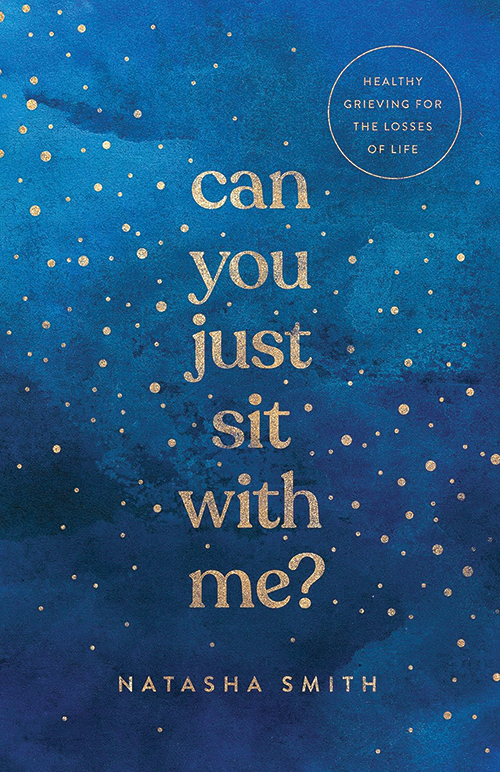
Can You Just Sit with Me?: Healthy Grieving for the Losses of Life
Reviewed by Carl Blumenthal
February 1, 2024
By Natasha Smith. InterVarsity Press, 2023. 192 pages. $18/paperback; $17.99/eBook.
Following the dedication page, this book opens with a poem of sorts, the last lines reading:
Can you just sit with me . . .
To listen.
To learn.
To show you care.
Can you just sit with me?
Who hasn’t lost people, places, and things along the road of life? By middle age, Natasha Smith had witnessed the deaths of numerous immediate and extended family members, friends, and colleagues—several caused by premature disease and accidents. She had given up her firstborn for adoption and given birth to a dead baby before four healthy ones. An African American, she had beat the odds of racism and poverty to become a Big Pharma engineer before resigning to homeschool her children.
Then came the pandemic, affecting People of Color disproportionately, and the deaths of George Floyd and others due to police brutality. If she never strayed too far from her North Carolina hometown—though the family home was eventually sold and demolished—her chameleon-like career path led her to become a writer, speaker, podcaster, photographer, teacher, and worship leader.
Painful as they are to recount, these anecdotes ground the book in Smith’s bedrock of faith in the Trinity, though in her form of evangelism, the Holy Spirit takes a back seat in the roller coaster of grief driven by God, with Jesus Christ riding shotgun. The challenge for me as an agnostic reader was to find the sweet spot on that back seat between human suffering and Divine Grace, because whether or not we believe in God and Jesus’s divinity, most Quakers accept the mystery of the Spirit.
The book’s 13 chapters undulate through the lows and highs of, on the one hand, losing loved ones and identities as well as feeling misplaced, and on the other, constantly rediscovering that God is good. They felt to me like a text version of 14 stations of the Cross (13 chapters plus the introduction), and I would characterize them as unlucky because grief is like a double-edged sword: cutting body, psyche, and soul, as well as liberating us from that time-bound notion that our losses are nonredeemable.
Smith is a plainspoken master of pithy declarations, such as: “Grief parades itself as love. But it hurts. It crushes. It turns even the most hopeful ones into the hopeless. . . . grief is not love.” (Earlier on this page, she reminds: “God is love, and love never fails.”) “When we make space in our day for grief, grief is less likely to take over our day.” “So, yes, we have the promise and hope of heaven, but we also have the promise and hope of heaven on earth now.”
In addition to quoting illustrative Scripture throughout from both the Old Testament and the New Testament, Smith reinterprets the grief of some of the Bible’s biggest “losers,” including Job; Joseph; Naomi; Hagar; and Moses’s mother, Jochebed. (Remember that she saved him from death through that water-borne adoption by Pharaoh’s daughter.)
Smith is attracted to people, who, like herself, have been dealt a bad hand and make the best of it through loyalty and steadfastness. She also relishes the words of grief counselors, whether spiritual or secular. It is not just a matter of an author wanting to attract more readers; she seems comfortable with the notion that faith is a tightrope between heaven and hell, a delicate dance requiring a mastery of the grieving process. It is as if we too are like Jesus on the Cross asking, “Why, Father, have you forsaken me?,” while being “stuck,” so to speak, in God’s death embrace: the one that leads to resurrection.
In his August 21, 2023 New Yorker article, “How the Authors of the Bible Spun Triumph from Defeat,” Adam Gopnik claims Jesus as a Jew was a quintessential loser, which is why crucifixion scenes are ubiquitous in religious art, compared to the rare depictions of the Ascension. As a Jewish Friend, this knowledge—that we have a lot of work to do to be worthy of heaven—appeals to my dual nature.
Smith writes: “But when we remember who God is and how he has a plan, we’re reminded that his plan is good. We can grasp only that what is good will come about in our lives even when it doesn’t feel like it and even when it doesn’t look like it.” I call this “learned optimism,” derived not from Sunday school but the school of hard knocks.
And given that the greatest (or smallest) loss of all is our own death, fulfillment in life depends on whether, like Natasha Smith, we devote ourselves to the healing and/or salvation of others.
Carl Blumenthal is a member of Brooklyn (N.Y.) Meeting and a mental health peer counselor studying to become an end-of-life midwife (death doula).



Comments on Friendsjournal.org may be used in the Forum of the print magazine and may be edited for length and clarity.